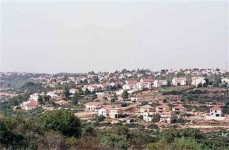Tuesday, April 5, 2016
Yesterday a group of students from NYU, an American university in New York City, came to visit Karnei Shomron. They were on a semester in Israel program and as part of a course on religion and politics, they were interested in how religious beliefs affected the settlement movement. They also wanted to learn more about the partnership between Jews and Christians on the settlement issue.
I was eager to meet these young students but as soon as they entered, before I even had a chance to open my mouth and say anything, I was met by a feeling of distance, bordering on hostility. They were extremely polite and respectful, but seemed suspicious of what I had to say. After my talk, there was time for questions and answers but very few had questions. I could not help but wonder if they gained anything from my talk and what exactly they were interested in learning.
We then took a short walk in the community and discussion continued. I made the point
that we were waiting for significant leaders in the Muslim world to condemn the terrorism

Karnei Shomron View
and extremism represented by ISIS and other violent groups, to create a counter-movement that would attract young Muslims to a different vision of Islam than the one presented by radical groups and that is sweeping across Europe, gathering recruits and potential terrorists at an alarming rate.
One of the students identified herself as an American Muslim and argued with me. She insisted that most Muslims were not supportive of ISIS and that whenever terrorist attacks were perpetrated by Muslims, her community would hold prayer vigils and reach out to the general community with a different message. I responded that such activities were positive but would not influence behaviors in the Middle East. And I challenged her and the others: “Where is the outrage expressed by a Muslim cleric on the streets of Gaza when Arabs are passing out candies in celebration of another Jew murdered in a terrorist attack? Where are the Muslim clerics who excommunicate or effectively disassociate themselves from the Muslim leaders who are preaching violence, terrorism and hatred.”
The instructor then stepped in to cut off the discussion with the following statement: “We all know there are many different narratives and we can discuss this further on the bus ride back.” We parted and they boarded their bus back to Tel Aviv.
But as I left them I continued to ponder the significance of the instructor’s statement regarding narratives. I can well understand that there was no time to iron out the differences in opinion between myself and the group. But the instructor did not mention a lack of time. He talked about narratives.
Are there no longer facts? I referred to factual situations — the distribution of candies and sweets on the streets of Gaza after 9-11 and subsequently, after numerous terrorist attacks against innocent Israelis. These incidents happened. They are fact. Can we no longer discuss the morality of incidents? Is it all relegated to narratives?
I am a Jew who lives in Israel. The Land of Israel is the ancestral homeland of the Jewish people and the Jewish people have come home to this land after nearly 2,000 years in exile. Is that a fact or a narrative?
Sometimes I feel as if I live in an ivory tower, cushioned and mercifully protected from the antagonism against Israel that is so prevalent in so many societies around the world. Universities are known to be hotbeds of anti-Semitic and anti-Israel sentiment. I am always deeply moved by accounts of students who participate in CUFI on Campus, as they recount the often harrowing experiences they have on their own campuses when they stand publicly for Israel. It must be so hard to stand up for what is right and true when so many around you are not even willing to acknowledge the facts that form the foundation of a pro-Israel opinion.
Israel is a very open society and our citizens have diverse opinions about so many things. But there are basic ideas that are part of the consensus. Zionism is part of our consensus. Even though there are some people on the far left of the political spectrum who are questioning the basics of Zionism, they remain a fringe. Soldiers who fight in the IDF are “our boys” and Israelis feel a camaraderie for one another, regardless of whether we are religious, traditional or secular. There are non-Jews in Israel who are somewhat outside this consensus, at least as a people group. But those non-Jews who have chosen to partner with the Jewish people, who define themselves as Zionist or as proud Israelis, are welcomed and treated as brothers and fellow travelers.
When I encounter people from abroad who are not part of our consensus at all, who question the very basis of our consensus and who cannot even agree on the facts that underlie our national story, I am at a loss. How can I convince anyone of the rightness of our cause if they don’t accept a single fact I present as truth? When we reduce disagreements to narratives, we can no longer argue points of view. If each person has his own narrative, there are no longer varying points of view about one story, but varying stories. We lose the ability to create consensus around one set of facts, one story. We lose the search for truth. And that is tragic.
